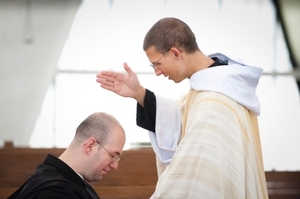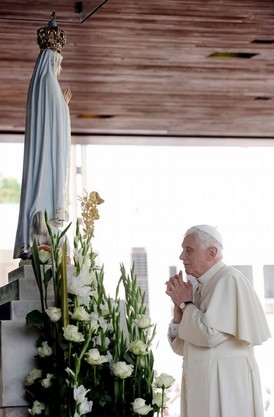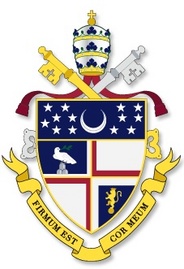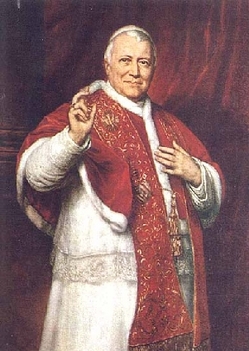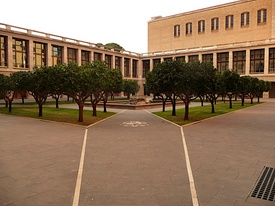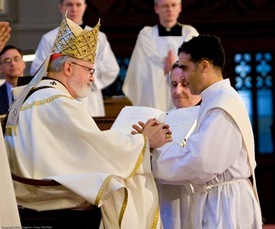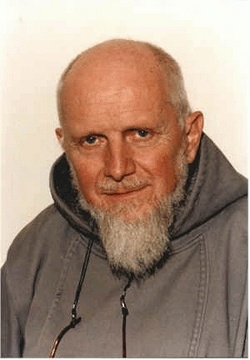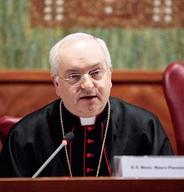 Mauro Cardinal Piacenza, Prefect of the Congregation of Clergy, is focusing on the life of the priest and how the Catholic priest lives the vocation given to him by the Holy Spirit. Piacenza is doing all he can to strengthen priesthood in all its vigor and beauty. In the style and content of Benedict XVI, Piacenza is calling for a Catholic reform of the priesthood, a reform that returns to the source. He said,
Mauro Cardinal Piacenza, Prefect of the Congregation of Clergy, is focusing on the life of the priest and how the Catholic priest lives the vocation given to him by the Holy Spirit. Piacenza is doing all he can to strengthen priesthood in all its vigor and beauty. In the style and content of Benedict XVI, Piacenza is calling for a Catholic reform of the priesthood, a reform that returns to the source. He said,
Category: Catholic priesthood
The priest is a fighting man
Preaching the first Mass of a newly ordained member of his monastic community, Benedictine Father Ambrose Bennett cited “Emmanuel Cardinal Suhard, who served as Archbishop of Paris
in the post-war years, expressed this mystery [of the priesthood] very eloquently in a beautiful
pastoral letter that he wrote to his priest on Holy Thursday of 1949:
At the altar, the priest, like
Christ, is the [sacrificial] victim. But he is also the sacrificer; he is then
the dreadful man, the one who works death, the one who slays sin and burns it,
the one who is crucified and who crucifies, the one who cannot save the world,
nor will consent to its salvation, save through nailing it to the Cross.
“Without the shedding of blood there is no redemption” (Heb. 9.22)… That is why
the priest in relation to society must always be somehow or other its
adversary. He will never be forgiven for recalling and perpetuating, from
generation to generation, Christ, whom they thought they had suppressed
forever… Far from being a fatherly adviser or a good-natured citizen, a priest
is, like God, a terrible being. He is a fighting man… Like Saint Michael, he
challenges the Dragon, dragging him out of ambush by healing men’s hearts, so
as to crush one by one his ever resurgent heads. Although it is too frequently
overlooked, a priest is an exorcist…; he has the power and the duty of
expelling the Devil (Cardinal Suhard, Priests Among Men, pp. 82-83; 44-45).
Sacramentorum sanctitatis tutela
The Congregation of the Doctrine for the Faith published today the norms reforming the law and process in dealing with clergy sex abuse cases under a motu proprio signed by Pope Benedict XVI, titled, Sacramentorum sanctitatis tutela (May 21, 2010).
The historical background: Historical Intro SST.pdf
The letter to the bishops: SST letter to bps.pdf
The Norms (Normae de Gravioribus Delictis)
Priest’s Prayer of Consecration to the Immaculate Heart of Mary
Today, the Holy Father who is making a pilgrimage to the Shrine of Our Lady of Fatima (Portugal) made this consecration of for himself and all priests to the Blessed Mother, Mother of God, Mother of Priests, Mother of the Blessed Sacrament. The Pope’s prayer is presented here for all priests to pray at the Mary Altar.
Immaculate Mother, in this place of grace, called together by the love of your Son Jesus
the Eternal High Priest, we, sons in the Son and his priests, consecrate ourselves to your maternal Heart, in order to carry out faithfully the Father’s Will.
We are mindful that, without Jesus, we can do nothing good (cf. Jn 15:5) and that only through him,with him and in him, will we be instruments of salvation for the world.
Bride of the Holy Spirit, obtain for us the inestimable gift of transformation in Christ. Through the same power of the Spirit that overshadowed you, making you the Mother of the Savior, help us to bring Christ your Son to birth in ourselves too. May the Church be thus renewed by priests who are holy, priests transfigured by the grace of him who makes all things new.
Mother of Mercy, it was your Son Jesus who called us to become like him: light of the world and salt of the earth (cf. Mt 5:13-14).
Help us, through your powerful intercession, never to fall short of this sublime vocation, nor to give way to our selfishness, to the allurements of the world and to the wiles of the Evil One.
Preserve us with your purity, guard us with your humility and enfold us with your maternal love that is reflected in so many souls consecrated to you, who have become for us true spiritual mothers.
Mother of the Church, we priests want to be pastors who do not feed themselves but rather give themselves to God for their brethren, finding their happiness in this. Not only with words, but with our lives, we want to repeat humbly, day after day, our “here I am.”
Guided by you, we want to be Apostles of Divine Mercy, glad to celebrate every day the Holy Sacrifice of the Altar and to offer to those who request it the sacrament of Reconciliation.
Advocate and Mediatrix of grace, you who are fully immersed in the one universal mediation of Christ, invoke upon us, from God, a heart completely renewed that loves God with all its strength and serves mankind as you did.
Repeat to the Lord your efficacious word: “They have no wine” (Jn 2:3), so that the Father and the Son will send upon us a new outpouring of the Holy Spirit. Full of wonder and gratitude at your continuing presence in our midst, in the name of all priests I too want to cry out: “Why is this granted me, that the mother of my Lord should come to me?” (Lk 1:43).
Our Mother for all time, do not tire of “visiting us”, consoling us, sustaining us. Come to our aid and deliver us from every danger that threatens us. With this act of entrustment and consecration, we wish to welcome you more deeply, more radically, for ever and totally into our human and priestly lives.
Let your presence cause new blooms to burst forth in the desert of our loneliness, let it cause the sun to shine on our darkness, let it restore calm after the tempest, so that all mankind shall see the salvation of the Lord, who has the name and the face of Jesus,
who is reflected in our hearts, for ever united to yours!
Amen.
Is a Strong Priesthood In the World’s Future? asks Massimo Camisasca
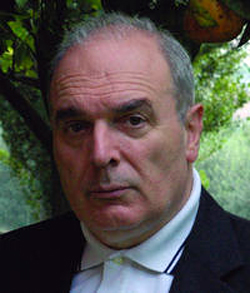 On February 26th Zenit published an article by Father Massimo Camisasca looking at what he considers to be the pillars (prayer & Liturgy) of priestly reform in the Catholic Church. Reading a bit of Church history recently there’s been a lot to consider when thinking about the state of the Catholic Church viz. the rise of Portestantism and then the decline of the Christian religion in some parts of the
On February 26th Zenit published an article by Father Massimo Camisasca looking at what he considers to be the pillars (prayer & Liturgy) of priestly reform in the Catholic Church. Reading a bit of Church history recently there’s been a lot to consider when thinking about the state of the Catholic Church viz. the rise of Portestantism and then the decline of the Christian religion in some parts of the
Statistical data of the past 30 years reveals an increase of 5% more diocesan priests worldwide, compared with an increase of 48% more baptized persons.
This alone could explain the question in the title of my latest book, “Padre ci saranno ancora sacerdoti nel futuro della Chiesa?” (Father, Will There Still Be Priests in the Future of the Church?) — a theme that underlies the entire text.
However, even more than the number of priests, the Church is interested in the truth of their experience. For reasons connected with my work as superior of a fraternity of missionaries, I travel throughout the world and am in contact with the most diverse realities. And, meeting with priests of different regions, I note that many of them experience difficulties not so much of an ideological type as of an emotional order.
Why is it that today the priestly life — which has made thousands of men happy and contributed enormously to the spiritual growth of humanity — is going through such a profound qualitative crisis?
My [Italian-language] book stems from this question. It is an attempt to rethink the life of a priest from its roots.
Rebirth
The regeneration of priestly life is one of the conditions for the new flowering of Christianity in
I have attempted to trace the path for a rebirth returning to the fundamentals of the priesthood. I find one of those fundamentals in prayer.
Today many priests lose themselves in action, in the infinite number of activities and preoccupations that entrap them. For the action of each one of us to always be a source of nourishment, it must be constantly redirected to our relationship with Christ. And the place of our relationship with Christ is prayer, inseparable from silence.
Silence, prayer, reflection and study are the answer to one of the evils that afflict the figure of the priest: activism, which remains on the surface of things and absorbs the time of our energies and our feelings. Instead, action that stems from charity introduces us in the work of God, who precedes and exceeds us.
Liturgy
Another pillar of the renewal of priestly life is the liturgy. I say this following the teaching of the Pope. I am not ruled by the desire to accommodate myself to a current, but by a profound conviction that is born from experience.
If the priest does not rediscover the true meaning of the liturgy in his life, he cannot find himself.
Surmounting the process of trivialization, which we have witnesses in the last 30 years, it is necessary to return to that “fons et origo” that the Second Vatican Council identifies in the liturgy.
When it is faithful to the one who instituted it, when it is lived in all its rigorous totality and is attentive to the tradition of the Church, the liturgy is the place of education to communion.
The protagonist of the liturgy is Christ. By living the liturgy, we can enter into the life of God, and only thus can we priests be an effective company of men.
In the third place, the emotional question is central in the life of a priest. Loneliness is the other great evil that today afflicts thousands of priests.
Only by discovering himself a son can the priest be a father.
Friendship is a positive experience in a person’s emotional life. In the Church there is still much fear of friendship. Pathologies are not channeled if one is not helped to develop a healthy life.
Unhealthy and negative friendships, which because of this are not proper friendships, must not close us off from the essential value of these bonds of preference that open us to the love of others and help us to understand who God is.
Exchanging a baseball cap for a biretta: becoming a priest
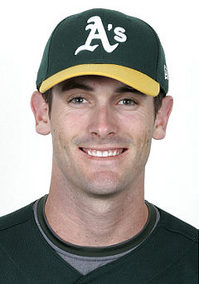 Making the rounds is the story that a top baseball player is following his true love, Jesus Christ by becoming a Catholic priest. Grant Desme, 23, is leaving the Oakland A’s for Saint Michael’s Abbey, a Norbertine community of priests and brothers in southern California. The community of Saint Michael’s is young, dynamic and they think with the Church…no surprise they’re getting vocations. Famous for their white habit and white biretta, the Canons Regular of Premontre were founded by Saint Norbert c. 1121.
Making the rounds is the story that a top baseball player is following his true love, Jesus Christ by becoming a Catholic priest. Grant Desme, 23, is leaving the Oakland A’s for Saint Michael’s Abbey, a Norbertine community of priests and brothers in southern California. The community of Saint Michael’s is young, dynamic and they think with the Church…no surprise they’re getting vocations. Famous for their white habit and white biretta, the Canons Regular of Premontre were founded by Saint Norbert c. 1121.
Making good priests…the greatest achievement
To make good priests is the greatest achievement in
the world: it is impossible to conceive anything greater or more
important. To devote oneself to making good priests and to cooperate to
this end – is to fulfill the very task of Jesus Christ.
Pope reminds the Pontifical North American College (Rome) to remain faithful to its founding principals
As part of the 150th anniversary celebration of the Pontifical North American College, Pope Benedict XVI addressed a gathering of cardinals, bishops, priests, students and friends of the College on January 9, 2010. The PNAC was founded by Blessed Pius IX.
I am pleased to welcome the alumni of the Pontifical North
American College, together with the Rector, faculty and students of the
seminary on the Janiculum hill, and the student priests of the Casa Santa Maria
dell’Umiltà. Our meeting comes at the conclusion of the celebrations marking
the one hundred and fiftieth anniversary of the College’s establishment by my
predecessor, Blessed Pius IX. On this happy occasion I willingly join you in
thanking the Lord for the many ways in which the College has remained faithful
to its founding vision by training generations of worthy preachers of the
Gospel and ministers of the sacraments, devoted to the Successor of Peter and
committed to the building up of the Church in the United States of America.
It
is appropriate, in this Year for Priests, that you have returned to the College
and this Eternal City in order to give thanks for the academic and spiritual
formation which has nourished your priestly ministry over the years. The
present Reunion is an opportunity not only to remember with gratitude the time
of your studies, but also to reaffirm your filial affection for the Church of
Rome, to recall the apostolic labors of the countless alumni who have gone
before you, and to recommit yourselves to the high ideals of holiness, fidelity
and pastoral zeal which you embraced on the day of your ordination. It is
likewise an occasion to renew your love for the College and your appreciation
of its distinctive mission to the Church in your country.
During my Pastoral
Visit to the United States, I expressed my conviction that the Church in
America is called to cultivate “an intellectual ‘culture’ which is
genuinely Catholic, confident in the profound harmony of faith and reason, and
prepared to bring the richness of faith’s vision to bear on the pressing issues
which affect the future of American society” (Homily at Nationals Stadium,
Washington, 17 April 2008). As Blessed Pius IX rightly foresaw, the Pontifical
North American College in Rome is uniquely prepared to help meet this perennial
challenge. In the century and a half since its foundation, the College has
offered its students an exceptional experience of the universality of the
Church, the breadth of her intellectual and spiritual tradition, and the
urgency of her mandate to bring Christ’s saving truth to the men and women of
every time and place. I am confident that, by emphasizing these hallmarks of a
Roman education in every aspect of its program of formation, the College will
continue to produce wise and generous pastors capable of transmitting the
Catholic faith in its integrity, bringing Christ’s infinite mercy to the weak
and the lost, and enabling America’s Catholics to be a leaven of the Gospel in
the social, political and cultural life of their nation.
Dear brothers, I pray
that in these days you will be renewed in the gift of the Holy Spirit which you
received on the day of your ordination. In the College chapel, dedicated to the
Blessed Virgin Mary under the title of the Immaculate Conception, Our Lady is
portrayed in the company of four outstanding models and patrons of priestly
life and ministry: Saint Gregory the Great, Saint Pius X, Saint John Mary
Vianney and Saint Vincent de Paul. During this Year for Priests, may these
great saints continue to watch over the students who daily pray in their midst;
may they guide and sustain your own ministry, and intercede for the priests of
the United States. With cordial good wishes for the spiritual fruitfulness of
the coming days, and with great affection in the Lord, I impart to you my
Apostolic Blessing, which I willingly extend to all the alumni and friends of
the Pontifical North American College.
A priest’s obedience = remaining in truth, says Archbishop Piacenza
Obedience is part of everyone’s human experience. Right now I can’t think of anyone on the planet who is not called/bound to some type of obedience. Can you? In the Catholic priesthood the man being ordained a priest makes a promise of respect and obedience to the bishop (if the man is going to be a diocesan priest), for life. How counter-cultural that is! In a regular letter to those interested, the secretary at the Congregation for Clergy has been writing periodic letters exploring various themes in the priesthood because we are in the “Year for Priests.” Today’s reflection is on priestly obedience.
obedience, ordinands profess a “promise” of “filial respect and obedience” to
their own Ordinary and his Successors. If the theological standing of a Vow and
a promise is different, the total and definitive moral obligation is identical,
and likewise identical is the offering of one’s will to the will of Another: to
the Divine will, mediated through the Church.
it is by relativism and democraticism, by various forms of autonomous
individualism and libertinism, such a promise of obedience appears ever more
incomprehensible to the prevailing mindset. It is not rare for it to be
conceived as a diminution of dignity and human freedom, as a perseverance in obsolete
forms, typical of a society incapable of authentic emancipation.
authentic obedience know well that this is not the case. Obedience in the
Church is never contrary to the dignity and respect of the person, nor must it
ever be understood as an abandonment of responsibility or as a surrender. The
Rite utilizes a fundamental adjective for the right understanding of such a
promise; it defines obedience only after mentioning “respect”, and this with
the adjective “filial”. Now the term “son”, in every language, is a relative
name, which implies, specifically, the relationship of a father and a son. It
is in this context that the obedience we have promised must be understood. It
is a context in which the father is called to truly be a father, and the son to
recognize his own sonship and the beauty of the fatherhood that has been given
to him. As happens in the law of nature, no one chooses his own father, nor
does one choose one’s own sons. Therefore, we are all called, fathers and sons,
to have a supernatural regard for one another, one of great reciprocal clemency
and respect, that is to say the capacity to look at the other keeping always in
mind the good Teacher who has brought him into being, and who always,
ultimately, moulds him. Respect
is, by definition, simply this: to look at someone while keeping Another in
mind!
is possible, one which is not only formal, a mere execution of orders, but one
which is ardent, complete, attentive, which can really bring forth the fruits
of conversion and of “new life” in him who lives it.
Ordinary at the time of ordination and to his “Successors”, since the Church
always draws back from an excessive personalism: She has at heart the person,
but not the subjectivism that detracts from the power and the beauty, both
historical and theological, which characterize the Institution of obedience.
The Spirit resides also in the Institution, since it is of divine origin. The
Institution is charismatic, of its very nature, and thus to be freely bound by
it in time (the Successors) means to “remain in the truth”, to persevere in
Him, present and operative in his living body, the Church, in the beauty of the
continuity of time, of ages, which joins us enduringly to Christ and to his
Apostles.
